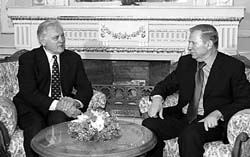Visit of European Equilibrium

With parliamentary elections in Ukraine to be held three days later, President Valdas Adamkus of Lithuania came to Kyiv on a brief six-hour visit. An undoubtedly Western person, who lived in the US and worked for almost thirty years for US intelligence agencies and is now an advocate of new Central European ideas and values, Mr. Adamkus is the only foreign leader to visit Kyiv on the eve of the elections. In addition, his visit might have helped achieve a certain balance in the overall situation against the backdrop of Russian comments that triggered a mixed reaction in and outside Ukraine.
In Kyiv, Mr. Adamkus spoke carefully, diplomatically, and in a European style. “Lithuania supports Ukraine’s aspiration to acquire the status of a European Union associate member and to deepen its special partnership relationship with NATO, as well the wish of Ukraine to join the World Trade Organization,” says the joint declaration signed by Valdas Adamkus and Leonid Kuchma, Interfax reports. “We share common goals and a common aspiration to be part of an ever-changing Europe,” Mr. Adamkus said after talks with his Ukrainian counterpart. “I am sure Ukraine will more forward after the elections.” The two heads of states agreed to found a Council of the Presidents of Ukraine and Lithuania to be convened at least once a year and consider “the most important” issues of regional and bilateral cooperation. It is also planned to explore the possibility of setting up interparliamentary and intergovernmental councils, and the Ukrainian-Lithuanian business forum. In general, Mr. Adamkus’s visit was just in time to remind Kyiv that it can be a participant in European, rather than just the object of Russian and American policies.
It is not to be ruled out that Mr. Adamkus had his own reasons to visit Kyiv so urgently. NATO is now drafting the agenda of its Prague summit to be held in November, on which Lithuania pins great hopes to be admitted to the alliance. This might well have stimulated the Lithuanian head of state to urgently discuss some questions with the his Ukrainian opposite number. It is also necessary for Vilnius, Kyiv, and Warsaw to coordinate their policies, something projected over five years ago toward Belarus, whose isolation from the West has never yielded any significant results.






